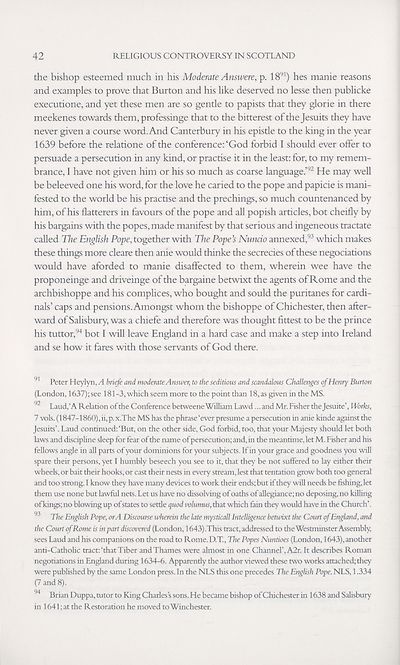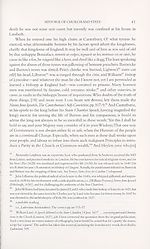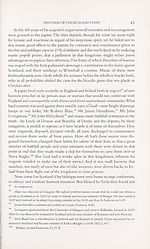Series 5 > Religious Controversy in Scotland 1625-1639
(57) Page 42
Download files
Complete book:
Individual page:
Thumbnail gallery: Grid view | List view

42
RELIGIOUS CONTROVERSY IN SCOTLAND
the bishop esteemed much in his Moderate Answere, p. 1891) hes manie reasons
and examples to prove that Burton and his like deserved no lesse then publicke
executione, and yet these men are so gentle to papists that they glorie in there
meekenes towards them, professinge that to the bitterest of the Jesuits they have
never given a course word. And Canterbury in his epistle to the king in the year
1639 before the relatione of the conference:‘God forbid I should ever offer to
persuade a persecution in any kind, or practise it in the least: for, to my remem¬
brance, I have not given him or his so much as coarse language.’92 He may well
be beleeved one his word, for the love he caried to the pope and papicie is mani¬
fested to the world be his practise and the prechings, so much countenanced by
him, of his flatterers in favours of the pope and all popish articles, bot cheifly by
his bargains with the popes, made manifest by that serious and ingeneous tractate
called The English Pope, together with The Pope’s Nuncio annexed,93 which makes
these things more cleare then anie would thinke the secrecies of these negociations
would have aforded to manie disaffected to them, wherein wee have the
proponeinge and driveinge of the bargaine betwixt the agents of Rome and the
archbishoppe and his complices, who bought and sould the puritanes for cardi¬
nals’ caps and pensions. Amongst whom the bishoppe of Chichester, then after¬
ward of Salisbury, was a chiefe and therefore was thought fittest to be the prince
his tuttor,94 bot I will leave England in a hard case and make a step into Ireland
and se how it fares with those servants of God there.
91 Peter Heylyn, A briefe and moderate Answer, to the seditious and scandalous Challenges ofHenry Burton
(London, 1637);see 181-3, which seem more to the point than 18,as given in the MS.
92 Laud,‘A Relation of the Conference betweene William Lawd... and Mr. Fisher the Jesuite’, Works,
1 vols. (1847-1860), ii, p. x.The MS has the phrase ‘ever presume a persecution in anie kinde against the
Jesuits’. Laud continued:‘But, on the other side, God forbid, too, that your Majesty should let both
laws and discipline sleep for fear of the name of persecution; and, in the meantime, let M. Fisher and his
fellows angle in all parts of your dominions for your subjects. If in your grace and goodness you will
spare their persons, yet I humbly beseech you see to it, that they be not suffered to lay either their
wheels, or bait their hooks, or cast their nests in every stream, lest that tentation grow both too general
and too strong. I know they have many devices to work their ends; but if they will needs be fishing, let
them use none but lawful nets. Let us have no dissolving of oaths of allegiance; no deposing, no killing
of kings; no blowing up of states to settle quod volumus, that which fain they would have in the Church’.
93 The English Pope, or A Discourse wherein the late mysticall Intelligence betwixt the Court of England, and
the Court of Rome is in part discovered (London, 1643).This tract, addressed to the Westminster Assembly,
sees Laud and his companions on the road to Rome.D.T, The Popes Nuntioes (London, 1643),another
anti-Catholic tract:‘that Tiber and Thames were almost in one Channel’, A2r. It describes Roman
negotiations in England during 1634-6. Apparently the author viewed these two works attached; they
were published by the same London press. In the NLS this one precedes The English Pope. NLS, 1.334
(7 and 8).
94 Brian Duppa, tutor to King Charles’s sons. He became bishop of Chichester in 1638 and Salisbury
in 1641; at the Restoration he moved to Winchester.
RELIGIOUS CONTROVERSY IN SCOTLAND
the bishop esteemed much in his Moderate Answere, p. 1891) hes manie reasons
and examples to prove that Burton and his like deserved no lesse then publicke
executione, and yet these men are so gentle to papists that they glorie in there
meekenes towards them, professinge that to the bitterest of the Jesuits they have
never given a course word. And Canterbury in his epistle to the king in the year
1639 before the relatione of the conference:‘God forbid I should ever offer to
persuade a persecution in any kind, or practise it in the least: for, to my remem¬
brance, I have not given him or his so much as coarse language.’92 He may well
be beleeved one his word, for the love he caried to the pope and papicie is mani¬
fested to the world be his practise and the prechings, so much countenanced by
him, of his flatterers in favours of the pope and all popish articles, bot cheifly by
his bargains with the popes, made manifest by that serious and ingeneous tractate
called The English Pope, together with The Pope’s Nuncio annexed,93 which makes
these things more cleare then anie would thinke the secrecies of these negociations
would have aforded to manie disaffected to them, wherein wee have the
proponeinge and driveinge of the bargaine betwixt the agents of Rome and the
archbishoppe and his complices, who bought and sould the puritanes for cardi¬
nals’ caps and pensions. Amongst whom the bishoppe of Chichester, then after¬
ward of Salisbury, was a chiefe and therefore was thought fittest to be the prince
his tuttor,94 bot I will leave England in a hard case and make a step into Ireland
and se how it fares with those servants of God there.
91 Peter Heylyn, A briefe and moderate Answer, to the seditious and scandalous Challenges ofHenry Burton
(London, 1637);see 181-3, which seem more to the point than 18,as given in the MS.
92 Laud,‘A Relation of the Conference betweene William Lawd... and Mr. Fisher the Jesuite’, Works,
1 vols. (1847-1860), ii, p. x.The MS has the phrase ‘ever presume a persecution in anie kinde against the
Jesuits’. Laud continued:‘But, on the other side, God forbid, too, that your Majesty should let both
laws and discipline sleep for fear of the name of persecution; and, in the meantime, let M. Fisher and his
fellows angle in all parts of your dominions for your subjects. If in your grace and goodness you will
spare their persons, yet I humbly beseech you see to it, that they be not suffered to lay either their
wheels, or bait their hooks, or cast their nests in every stream, lest that tentation grow both too general
and too strong. I know they have many devices to work their ends; but if they will needs be fishing, let
them use none but lawful nets. Let us have no dissolving of oaths of allegiance; no deposing, no killing
of kings; no blowing up of states to settle quod volumus, that which fain they would have in the Church’.
93 The English Pope, or A Discourse wherein the late mysticall Intelligence betwixt the Court of England, and
the Court of Rome is in part discovered (London, 1643).This tract, addressed to the Westminster Assembly,
sees Laud and his companions on the road to Rome.D.T, The Popes Nuntioes (London, 1643),another
anti-Catholic tract:‘that Tiber and Thames were almost in one Channel’, A2r. It describes Roman
negotiations in England during 1634-6. Apparently the author viewed these two works attached; they
were published by the same London press. In the NLS this one precedes The English Pope. NLS, 1.334
(7 and 8).
94 Brian Duppa, tutor to King Charles’s sons. He became bishop of Chichester in 1638 and Salisbury
in 1641; at the Restoration he moved to Winchester.
Set display mode to:
![]() Universal Viewer |
Universal Viewer | ![]() Mirador |
Large image | Transcription
Mirador |
Large image | Transcription
Images and transcriptions on this page, including medium image downloads, may be used under the Creative Commons Attribution 4.0 International Licence unless otherwise stated. ![]()
| Scottish History Society volumes > Series 5 > Religious Controversy in Scotland 1625-1639 > (57) Page 42 |
|---|
| Permanent URL | https://digital.nls.uk/127328649 |
|---|
| Description | Over 180 volumes, published by the Scottish History Society, containing original sources on Scotland's history and people. With a wide range of subjects, the books collectively cover all periods from the 12th to 20th centuries, and reflect changing trends in Scottish history. Sources are accompanied by scholarly interpretation, references and bibliographies. Volumes are usually published annually, and more digitised volumes will be added as they become available. |
|---|


